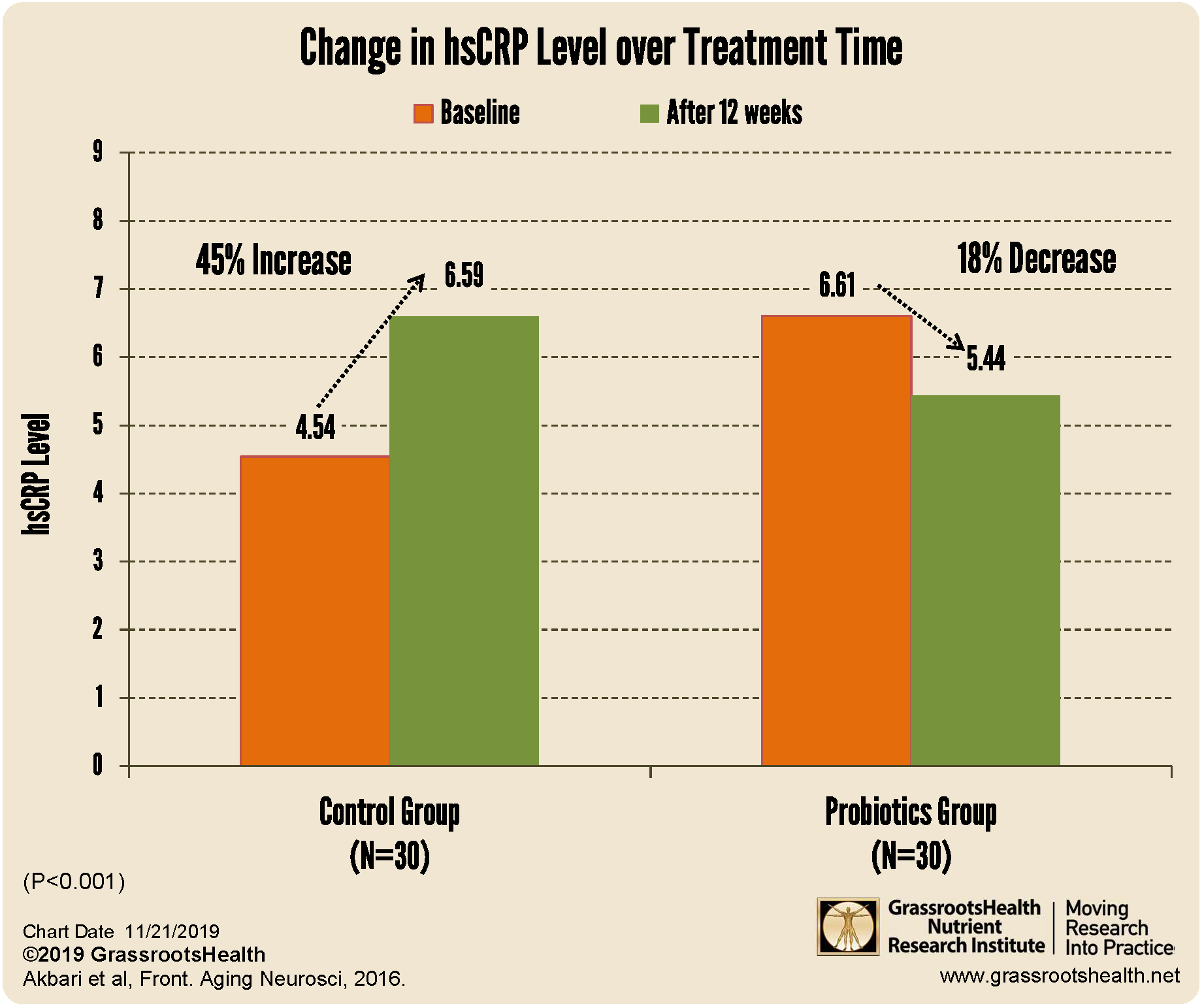Published on November 25, 2019
In a previous post, GrassrootsHealth reviewed a paper showing a relationship between UVB exposure, vitamin D, and the gut microbiome. The gut microbiome itself is known to have several effects on both mental and physical health. Approximately half of GrassrootsHealth participants have reported taking a probiotic supplement on a regular basis. Today, we will review a study that uncovered a link between supplementation with probiotics, which positively affects the gut microbiome, C-reactive protein (hsCRP) levels, and Alzheimer’s Disease.
Connection Between Probiotic Supplementation, Inflammation and Alzheimer’s
 A randomized controlled trial by Akbari et al., published in the journal Frontiers in Aging Neuroscience, followed 60 Alzheimer’s patients between the ages of 60 – 95, to determine whether probiotic supplementation had an effect on cognitive function and metabolic status. For 12 weeks, half of the participants received a probiotic milk mix that contained Lactobacillus acidophilus, Lactobacillus casei, Bifidobacterium bifidum, and Lactobacillus fermentum (the probiotics group), while the other half received regular milk (the control group). Before and after measurements for mental state (which was evaluated with the mini-Mental State Examination, or MMSE test), hsCRP, and other markers for metabolism and inflammation were completed.
A randomized controlled trial by Akbari et al., published in the journal Frontiers in Aging Neuroscience, followed 60 Alzheimer’s patients between the ages of 60 – 95, to determine whether probiotic supplementation had an effect on cognitive function and metabolic status. For 12 weeks, half of the participants received a probiotic milk mix that contained Lactobacillus acidophilus, Lactobacillus casei, Bifidobacterium bifidum, and Lactobacillus fermentum (the probiotics group), while the other half received regular milk (the control group). Before and after measurements for mental state (which was evaluated with the mini-Mental State Examination, or MMSE test), hsCRP, and other markers for metabolism and inflammation were completed.
At the end of the 12 weeks, the probiotics group had an improvement in their MMSE score, while the control group had a worse MMSE score; the difference between the two groups was statistically significant. In addition, the probiotics group saw an 18% decrease in hsCRP levels, while the control group saw a 45% increase in hsCRP levels from the beginning of the 12 weeks to the end.
In conclusion, the results from this study suggest that probiotic supplementation may help improve hsCRP levels and cognition in patients with Alzheimer’s Disease.
Do you know your hsCRP level?
Test now to know your level today with our Inflammation Panel test kit, which includes hsCRP along with vitamin D, the Omega-3 Index, AA:EPA and Omega-3:Omega-6 ratios, and HbA1c – all of which have been tied to inflammation. Take steps to keep your hsCRP level low and your vitamin D level within a target of 40-60 ng/ml or 100-150 nmol/L! Find out your levels today! Log on to the shop (click the link below) to get your tests and see for yourself if your level can be improved.
Make sure you track your results before and after, about every 6 months!
How can I track my nutrient intake and levels over time?
To help you track your supplement use and nutrient levels, GrassrootsHealth has created an online tracking system called myData-myAnswers. For each specific supplement, you can track what days you take it, how much, and many other details. This will help you know your true supplemental intake and what patterns of use work for you to reach and maintain optimum nutrient levels. Check it out today!







